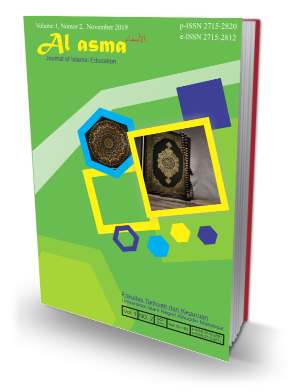PENGEMBANGAN MODUL BERBASIS MASALAH UNTUK MENINGKATKAN KEMAMPUAN PEMECAHAN MASALAH MATEMATIS SISWA KELAS VII SMP
Abstract
This research aims to develop a problem-based module to promote seventh grader’s mathematical problem-solving ability at SMPN 7 Cenrana in Maros Regency that meets the criteria of product validity, practicality, and effectiveness. It adopts Plomp Research & Development model which consists of several development phases namely preliminary investigation, design, realisation, test, evaluation and revision and implementation. The product was tested on students of class VII D of SMPN 7 Cenrana. This research employs some instruments to gather its data, such as expert validation sheet, student response questionnaire, teacher response questionnaire, teacher’s media management ability observation sheet, student activity observation sheet and problem-solving tests. The results of the limited trials show some important research findings as follows: (1) the module is categorised valid, as indicated by validity value 4.4 and scores within an interval of 4.3 ≤ 𝑀 ≤ 5; (2) the module has met practicality criteria owning to student’s positive response (85.53% and teacher’s highly positive response (84%); (3) the module is proclaimed effective as it has fulfilled three requirements, addressing teacher’s complimentary media management ability (4.6), high level of student’s activity (75.7%), as well as student’s unit completeness (81.5%). In summary, the problem-based module to promote seventh grader’s mathematical problem-solving ability at SMPN 7 Cenrana in Maros Regency has successfully fulfilled the criteria of validity, practicality and effectiveness.
Abstrak
Penelitian ini bertujuan untuk mengembangkan modul berbasis masalah untuk meningkatkan kemampuan pemecahan masalah matematika siswa pada materi aritmetika sosial yang valid, praktis, dan efektif di kelas VII SMPN 7 Cenrana kabupaten Maros. Dalam penelitian ini penulis menggunakan model pengembangan Plomp yang terdiri dari beberapa fase yaitu: Preliminary Investigation (investigasi awal), Design (desain), Realization (realisasi), Test, Evaluation and Revision (tes, evaluasi dan revisi), dan Implementation (implementasi). Subjek penelitian ini adalah siswa kelas VII D SMPN 7 Cenrana. Instrumen penelitian yang digunakan adalah lembar validasi ahli, angket respons siswa dan guru, lembar observasi kemampuan guru dalam mengelola pembelajaran, lembar observasi aktivitas siswa dan tes kemampuan pemecahan masalah. Berdasarkan hasil uji coba terbatas yang dilakukan, diperoleh bahwa (1) hasil validasi modul adalah 4,4 pada kategori sangat valid, (2) praktis karena persentase rata-rata untuk respons siswa adalah 85,53% pada kategori positif dan persentase rata-rata respons guru adalah 84% pada kategori sangat positif. (3) Efektif karena telah memenuhi tiga kriteria yaitu rata-rata kemampuan guru dalam mengelola pembelajaran adalah 4,6 pada kategori sangat baik, persentase rata-rata aktivitas siswa adalah 75,7% pada kategori sangat baik, dan persentase ketuntasan belajar siswa pada kategori tinggi serta mencapai ketuntasan klasikal yaitu 81,5%. Sehingga dapat disimpulkan bahwa berbasis masalah pada materi aritmatika sosial di kelas VII SMPN 7 Cenrana Kabupaten Maros telah memenuhi kriteria kevalidan, kepraktisan, dan keefektifan.
Downloads
References
Al Atiyah, R. (2014). Pengaruh Penggunaan Model Pembelejaan Siklus terhadap Kemampuan Pemecahan Masalah Matematika Siswa SMP N 1 Kampar. Universitas Islam Negeri Sultan Syarif Kasim Riau.
Arsyad, A. (2015). Media Pembelajaran. Jakarta: Rajawali Pres.
Khadijah, S. (2017). Pengembangan Bahan Ajar Matematika Berbasis Masalah Untuk Memfasilitasi Pencapaian Kemampuan Pemahaman Konsep Pada Pokok Bahasan Bentuk Aljabar Kelas Vii Di Smpn 1 Sungguminasa Kab. Gowa. In Skripsi. Makassar: Fakultas Tarbiyah dan Keguruan UIN Alauddin Makassar.
Meyer, R. (1978). Designing Learning Modules for InserriceTeacher Education. Australia: Center for Advancement of Teaching.
Simanungkalit, R. H. (2016). Pengembangan Perangkat Pembelajaran untuk Meningkatkan Kemampuan Pemecahan Masalah Matematis Siswa SMP Negeri 12 Pematangsiantar. Journal of Mathematics Education, Science and Technology, 1(1), 93–56.
Soemarmo, Utari dan Hendriana, H. (2014). Penilaian Pembelajaran Matematika. Bandung: Refika Aditama.
Sumartini, T. S. (2016). Peningkatan Kemampuan Pemecahan Masalah Matematis Siswa Melalui Pembelajaran Berbasis Masalah. Jurnal Pendidikan Matematika, 5(2), 148–158.
Syahrir, dan S. (2015). Pengembangan Modul Pembelajaran Matematika SMP. Jurnal Ilmiah Mandala Education, 1(2), 162–171.
Wulandari, Y. (2016). Penerapan Model Pembelajaran Berbasis Masalah Terhadap Kemampuan Pemecahan Masalah Matematika Siswa Di SMP Negeri 1 Padang.
Yustianingsih, R., & Syarifuddin, H. (2017). Pengembangan Perangkat Pembelajaran Matematika Berbasis Problem Based Learning (Pbl ) Untuk Meningkatkan Kemampuan Pemecahan Masalah. 1(2), 258–274.
- Authors retain copyright and grant the journal right of first publication with the work simultaneously licensed under a Creative Commons Attribution License that allows others to share the work with an acknowledgement of the work's authorship and initial publication in this journal.
- Authors are able to enter into separate, additional contractual arrangements for the non-exclusive distribution of the journal's published version of the work (e.g., post it to an institutional repository or publish it in a book), with an acknowledgement of its initial publication in this journal.
- Authors are permitted and encouraged to post their work online (e.g., in institutional repositories or on their website) prior to and during the submission process, as it can lead to productive exchanges, as well as earlier and greater citation of published work (See The Effect of Open Access).

